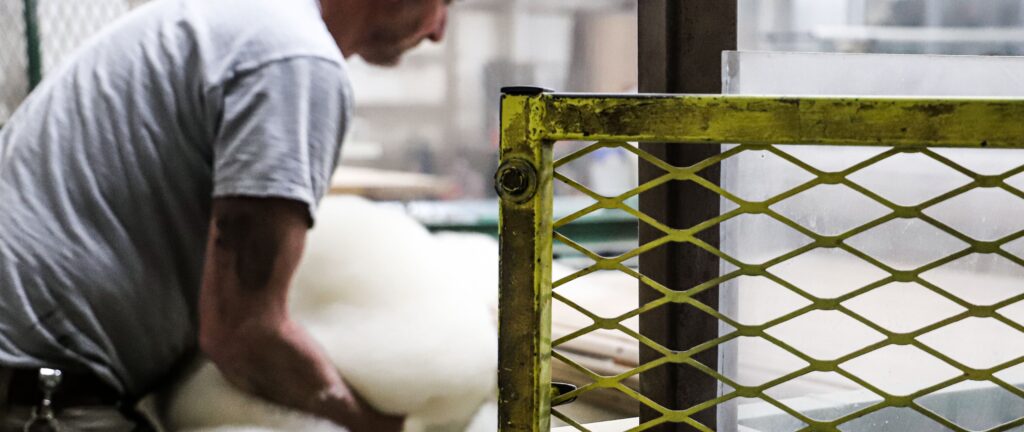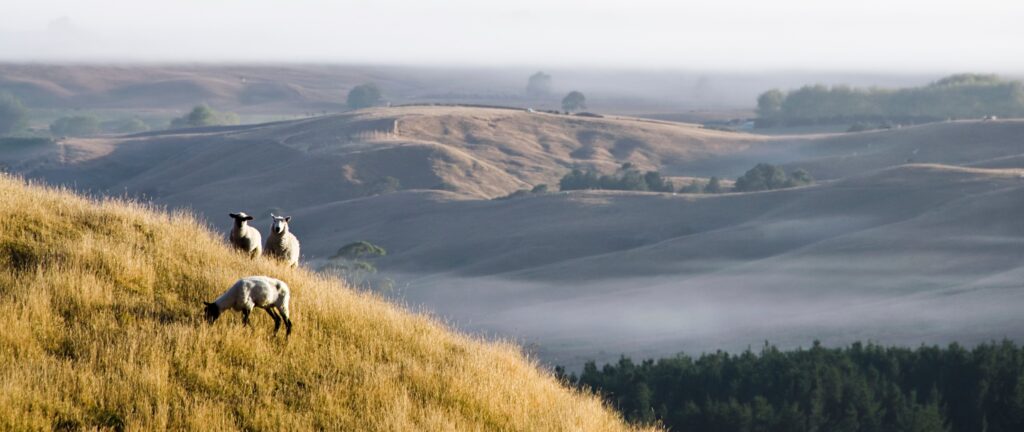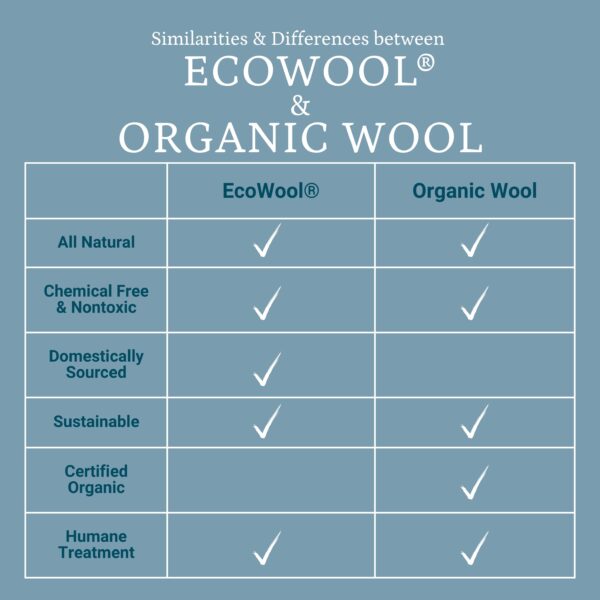As a retailer of fine bedding, many of our customers come to us after a lot of research, and they often have lots of great questions. Here’s one we hear a lot: “What’s the difference between EcoWool® and organic wool?”
We offer both options for our pillows, toppers, and comforters, and we love them both. So what does a customer need to know to make the best decision?

Presenting…EcoWool!
EcoWool is a trademarked wool product that comes to us exclusively from The Woolgatherer Carding Mill in Montague, California. We work closely with them thanks to their commitment to a superior product, and we’ve been sourcing EcoWool from them almost as long as we’ve been a business.
EcoWool isn’t just any old wool. It begins with ranchers who take pride in their work, raising sheep on open pastures according to humane treatment standards and caretaking the land. It’s not just about the sheep—it’s about the soil, the water, and the entire ecosystem. No pesticides or herbicides are used, and attentive, holistic veterinary practices keep sheep healthy instead of mass doses of antibiotics and chemical baths.
Several breeds of sheep are used to create the perfect proprietary blend: Corriedale, Suffolk, Dorset, Cheviot, Romney, Morrit, Coopworth, and Columbia. These breeds have been proven to produce an ideal combination of fiber length and quality for wool batting, as well as providing variety that prevents disease. Approaching it this way helps the mill avoid common wool industry tactics like carbonizing to remove debris from the wool, bleaching for that consistently white wool color, and mechanical or chemical crimping to give the wool back some of its texture after it’s been removed from the first two processes. EcoWool starts and finishes with just naturally good wool.
We get the batting fresh off the mill’s antique wool carding machinery that was fabricated in 1917. The batting from this machine is unique and amazing to work with. The carding machine was originally made to prepare wool for spinning, which requires super clean wool to start, and when it goes through the entire carding process, the wool is even cleaner and exceptionally lofty—just perfect for our mattresses, pillows, comforters, and toppers.
The extra cool part? EcoWool is a 100% domestic product, and our commitment to using it directly supports sheep ranchers we work with in Northern California and Southern Oregon. This is our home region, and research has shown that when we purchase locally, those dollars continue circulating in our community, strengthening the economy. The American wool industry was near collapse two decades ago due to the rise in synthetic fabrics. It’s bouncing back today as people rediscover the truly sustainable qualities of wool, plus its outstanding performance characteristics, and EcoWool is an integral part of that recovery. Being local to us helps cut down on carbon emissions from transport as well, adding to the already awesome sustainability profile of wool.
So, you see, bedding made with EcoWool isn’t just your average pillow or comforter. It’s a vote for your health, the health of our communities, and the health of our planet.

And Now For…Organic!
Organic is also pretty cool, we must say. It’s got many of the same benefits, but with a few key differences.
The wool in our GOTS-certified organic products comes from New Zealand, a part of the world with a long and storied relationship with sheep, and it undergoes a stringent process with oversight. In addition, for a product to be labeled as such, every component from thread to buttons to zippers must also be organic and have undergone the same certification process. Certification requires effort and cost, but this became necessary in order to address fraud and greenwashing in the textile industry so that consumers could feel secure in their purchases.
We wish it was easier to source organic wool domestically, but unfortunately, the supply just isn’t there. So while it has a bigger carbon footprint coming from New Zealand, it still excels in every other health and sustainability category, and it allows us to offer an organic product.

So How Do We Choose?
We’ve learned over the years that the reasons people have for shopping for a mattress are as individual as the person. There are many reasons for considering wool bedding, and many reasons someone might want organic or might prefer EcoWool.
For some people, the organic certification is important. Whether it’s for health reasons, meeting certain standards, or merely aesthetic, they appreciate the peace of mind that comes with the label.
For folks who love supporting local, sustainable agriculture and businesses, EcoWool is the way to go. It’s important to note, that for all intents and purposes, EcoWool is just as chemical free, healthy, and safe as organic wool. The only difference is that for many of our wool suppliers, the organic certification process represents too great a cost and distraction from their daily duties of raising sheep, so they opt out.
And because there’s no extra certification processes involved, EcoWool products come in at a slightly lower price point as well.
Luckily, you can’t go wrong!
- Both are amazing.
- Both are all natural, chemical free, nontoxic, sustainable, and comfortable.
- Both come from happy sheep raised on pasture that are humanely treated and respectfully sheared.
- Both are guaranteed to help you sleep your best night’s sleep.
In a blind sleep test, they feel identical and perform wonderfully.
We hope this has cleared up any questions you’ve had about our two wool options! Let us know if there’s anything else you need to know about this. In the meantime, be sure to check out our social pages on Instagram and Pinterest for more about the wonders of wool. And as always—sweet dreams!

